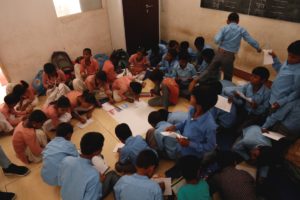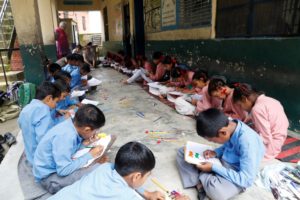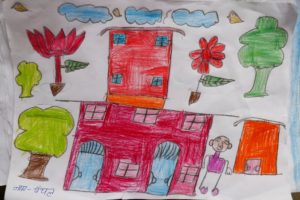

 Come back from a volunteering workcamp with RUCHI in education field, Daniele thinks about the teachings of his experience, between work in schools and meetings with the local people: «Solidarity makes us freer people, because it gives us the obstinacy to do not give up in front of the ugliness of the world».
Come back from a volunteering workcamp with RUCHI in education field, Daniele thinks about the teachings of his experience, between work in schools and meetings with the local people: «Solidarity makes us freer people, because it gives us the obstinacy to do not give up in front of the ugliness of the world».
One month and more passed since I came back in Italy from the volunteer camp with RUCHI, and every day, several times a day, I still have India in my mind. Well, it would be better to say that my head is happily “occupied” by the people I met there, around the villages of Bandh and Patta in the early Himalayan heights of the northern state of Himachal Pradesh; my mind is occupied by images of wonder crystallized in it as photographs, and by the children with whom I worked in schools, by the deep difficulties I encountered and perceived, by the teachings of an experience that will accompany me for the rest of my life’s path.
This is why I renamed inside me “Educate a child” (the name of the workcamp in which I participated between July and August, thanks to Ruchi and to the Italian organization Lunaria) in “Educate a child to educate yourself”.
And for this I believe that volunteering is a fundamental activity for the development of an authentic, supportive, less individualistic personality than what tends to form my Western society: volunteering helps us to understand that we human beings are relationship, we are “programmed” by the Nature to stay together, collaborate and comfort each other. So volunteering helps to understand that cooperation – rather than competition – is a basic principle of the evolution of the species, and not only the human one, as scientific studies are showing more and more.
In short, volunteering leads us to understand that when we help, we are helped at the same time, often (or always?) we are helped much more than we can offer: solidarity makes us freer people, because it gives us the obstinacy to do not give up in front of the ugliness of the world and in front of the inner solitude that we can experience in our chaotic everyday life or in the difficulties of life.
Believe me, my words are not rhetorical: they come from afar, from twenty years ago with the first experiences of solidarity that I lived thanks to the Boy Scout group “Voghera 1”, determinant for my personal development, and they pass – among other things – from a European Voluntary Service (Evs) in Macedonia to arrive today, to this voluntary camp that it was supposed to end in two weeks and that instead, once I was there among the Indian villages of the Himalayan heights, I decided to extend to three weeks, eating without hesitation the tourist programs I had hypothesized before leaving.
I am convinced of this: in my experiences of volunteering, I was helped more than I helped others, if I’ve ever helped someone. For example, my Evs in Macedonia offered me the opportunity to find a job more easily once I returned to Italy, while the workcamp in India – thanks to the activities with the children in the schools – put the stamp on a desire I had been gaining for months: to become a teacher of primary school, and consequently to attend again the university to obtain the teaching qualification needed in Italy.
At 33 years old, already graduated and with an important and recent professional change (from journalism to education field), the workcamp gave me a big help in deciding to become a teacher and so to study again for some years.
I believe that courage can not be given by ourselves: it is built in relationships with other people, you chisel it together.
And so I can only be grateful to those who allowed me to live this experience: Ruchi and Lunaria, the other volunteers, the Indian teachers with whom I collaborated, the children grateful of laughter and hugs and that I saw climbing up mountain paths to come back home after school, the villagers who offered me meals, tea, invitations to return, and especially smiles, smiles and smiles, both addressed to me and exchanged between them.
This is the greatest teaching that the people of Himachal Pradesh put me in the backpack: the difficulties must be faced lightly. This doesn’t mean superficiality, but a “soul’s predisposition” useful to overcome obstacles, or at least to cross them without a feeling of excessive oppression. Life is difficult and against this fact of nature we can’t do anything (let’s omit now that we human beings complicate life even more, enormously): we can however equip our attitude to life.
So, thinking about my experience during Ruchi’s workcamp, if the monsoon breaks down water on the ground, it is useless to get angry: I saw little girls get on the bus drenched with rain and joy, greeted by adult travelers with equal joy, not with the worry of a possible cold.
In the fields, I saw peasants with their faces half-covered by heavy bundles of grass brought to their heads: the bright opening of their smiles towards me gave dawns to my spirit.
I saw cantons breaking the stones that fall down frequently on the road: they were singing and laughing.
I saw families united in a hard and simple life, without travels or washing machines: the urbanized people would call it a poor life, but in those eyes I saw more serenity than that shown by our Western looks.
Since I came back to Italy, if I risk to loose my patience for some nuisances, I stop and think: “The people of Himachal Pradesh would get angry? No. So I do not have either to get angry”.
I’d like to learn to look at life through the eyes of the Himachal.
I am grateful to those who allowed me to experience this regenerating, fruitful experience. With two associations of my town, Insieme (“Togheter”) and Orti Sociali di Voghera (“Social Gardens of Voghera”), we are planning a collaboration with Ruchi after having already raised funds before my departure in July. I used the funds during the project “Educate a child” to buy stationery for the children.
During my walks among the cultivated fields, among the perfume of coriander and the little clang of the water channels, I found in the branches of a plant a piece of cloth in white and red squares: the tear of a school uniform of a girl (the uniform of the boys instead is blue). I took the fabric and in Italy I made a (funny) bracelet, to mark the hope of returning among those mountains, among those children who haven’t desks in the public schools, or pastels to draw the fantasies placed in the minds of children; or among those children of the industrial city of Baddi who – because they are children of immigrant workers from other Indian States – live without rights in shantytowns (in Baddi there are about 16 thousands people living in the slums), but at least those children can attend some school centers dedicated to them, where I have been with Ruchi after adventurous bus trips to get off the mountains.
From a seed a plant is born, from a plant other seeds grow. And volunteering is a seed that never dies: it gives birth to a continuous new life. For this reason I hope that more and more young people (and I mean real young people, not thirty years old like me!) will participate in similar experiences, whether international workcamps or solidarity activities undertaken close to home: first of all, volunteering is good to yourself, and so you can learn to do something good even for the whole planet. Humanity included.
Daniele Ferro
www.danieleferro.it
